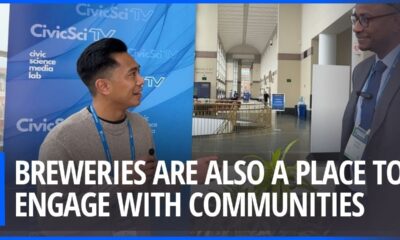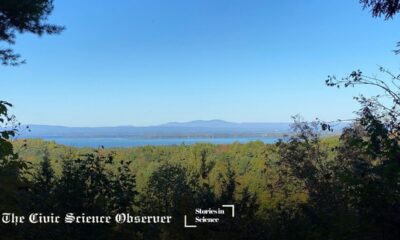Stories in Science Special Series
How To Be a Superstar With No Instructions

[su_boxbox title=”About” box_color=”#262733″]Marguerite Matthews is currently a AAAS Science & Technology Policy Fellow[/su_boxbox].
[dropcap]A[/dropcap]t 4 years old, I was sure I’d be a superstar! My father has endless video recordings of me prancing around, belting out my favorite songs or performing mundane tasks with Shakespearean theatrics. I was ready at a moment’s notice to give the camera – and whoever was around – the performance of a lifetime. Then, after seeing The Sound of Music, I wanted to be a nun like Fräulein Maria, and merge my religious proclivities with my love of singing and twirling. It wasn’t until my dad informed me I could only be married to Jesus that I decided to find a different calling. And that calling would be whatever captivated me at any given time.
As a pre-teen, my main interest was English. I loved to read books and write poems and short stories. Writing provided a creative outlet to express my personality, ideas, thoughts, and fancies – and other people enjoyed consuming my creations. I figured my affinity for writing would translate into a creative writing career. But the truth was I didn’t really worry about my future profession. I was a straight A student in honors and AP classes, so as far as I was concerned it was just a matter of choosing what subject area I liked most and going from there. I would’ve made a career out of being the smartest, most talented girl in the class if I could.

Marguerite Matthews
Then I met Mr. Nordell, my quirky high school chemistry teacher. His teaching style challenged me and piqued my interest in science in a way my other science teachers hadn’t. He suggested I apply for a youth summer research internship. I remember looking at him like he’d been inhaling fumes from the chemical stock room, because when I thought of lab work I thought of old white men with coke bottle glasses, and I clearly didn’t fit the description (or had he noticed?!). I applied anyway because I trusted his judgment. Plus, the internship was by the beach, paid well, and would look great on my college application.
Many of my experiments measuring the chemical dopamine in awake rats took two days to complete; but when any of the 6 to 8 steps failed (due to equipment malfunctions, uncooperative animals, or user error), I had to start over. I was always starting over, always troubleshooting, but never fully in control. I felt more like a swindler than a superstar. It was devastating to realize being smart, as I knew it, wasn’t enough to succeed. But I couldn’t quit; I worked too hard to leave empty-handed. So my pride and ego is what ultimately dragged me over the finish line.
I was accepted into the program and placed in a lab that studied neurogenesis, the birth of new brain cells. I’d never done more repetitive, tedious, boring work in my life – and I loved every minute of it! I learned many techniques and was meticulous in mastering them. One day, while painstakingly mounting tiny slices of mouse brain tissue onto a slide, a photographer walking through the lab asked to take a few pictures for a newsletter while I worked. Never one to shy from the camera, I agreed. What began with a few snapshots turned into a full photoshoot. I felt like a superstar! My lonesome labor, day in and day out, wasn’t glamorous but I managed to make it look cool. Who needed Hollywood when I could be in the spotlight, in my element, anywhere?
I went on to study chemistry in college with a pre-med focus, thinking I’d get an MD and PhD because I thought being a doctor twice was double the prestige. And I had a plan! I committed to becoming a physician scientist and had a village of support to ensure I was on the right track. But after a few interviews, I ditched that plan. It wasn’t the right fit. If I was to dedicate so many years to graduate education, I needed to enjoy my environment. On a whim, I applied to and got accepted into a PhD program at a university I knew little about but had sought to recruit me. After my visit, I felt like I belonged and could succeed.
I love a challenge, but let me tell you: grad school was the hardest thing I’ve ever done. I’ve never known failure so intimately. Over 7 years, I worked on 8 different projects, though only 2 of those were used for my dissertation – the study of the brain’s reward system. Many of my experiments measuring the chemical dopamine in awake rats took two days to complete; but when any of the 6 to 8 steps failed (due to equipment malfunctions, uncooperative animals, or user error), I had to start over. I was always starting over, always troubleshooting, but never fully in control. I felt more like a swindler than a superstar. It was devastating to realize being smart, as I knew it, wasn’t enough to succeed. But I couldn’t quit; I worked too hard to leave empty-handed. So my pride and ego is what ultimately dragged me over the finish line.
Now here I am with a PhD in neuroscience, doing a job completely unrelated to my research expertise (that I didn’t know you could even be paid to do!). I love where I am in life but could’ve never imagined this is where I’d end up from a whimsical kid or even a determined college student. My blood, sweat, and river of tears got me here, but it’s the support and guidance of mentors that allowed me access to amazing opportunities I likely wouldn’t have taken otherwise. Interests change, as do circumstances, and sometimes things just don’t work out. The important thing is to keep moving forward and command whatever space you occupy. And know that you can be a superstar anywhere; you just have to be ready to shine.
Metrics
Sessions
Total number of Sessions. A session is the period time a user is actively engaged with the page.
Visitors
Users that have had at least one session within the selected date range. Includes both new and returning users.
Page views
Pageviews is the total number of time the article was viewed. Repeated views are counted.
The CS Media Lab is a Boston-anchored civic science news collective with local, national and global coverage on TV, digital print, and radio through CivicSciTV, CivicSciTimes, and CivicSciRadio. Programs include Questions of the Day, Changemakers, QuickTake, Consider This Next, Stories in Science, Sai Resident Collective and more.

-
Audio Studio1 month ago
“Reading it opened up a whole new world.” Kim Steele on building her company ‘Documentaries Don’t Work’
-
 Civic Science Observer1 week ago
Civic Science Observer1 week ago‘Science policy’ Google searches spiked in 2025. What does that mean?
-
Civic Science Observer1 month ago
Our developing civic science photojournalism experiment: Photos from 2025
-
Civic Science Observer1 month ago
Together again: Day 1 of the 2025 ASTC conference in black and white
Contact
Menu
Designed with WordPress
























